-
 Bitcoin
Bitcoin $83,333.2617
0.07% -
 Ethereum
Ethereum $1,820.9206
0.04% -
 Tether USDt
Tether USDt $0.9995
-0.04% -
 XRP
XRP $2.0632
0.56% -
 BNB
BNB $593.8431
-0.09% -
 USDC
USDC $0.9999
-0.01% -
 Solana
Solana $116.9473
-1.86% -
 Dogecoin
Dogecoin $0.1628
-1.33% -
 Cardano
Cardano $0.6517
0.85% -
 TRON
TRON $0.2381
1.11% -
 Toncoin
Toncoin $3.5643
-7.90% -
 UNUS SED LEO
UNUS SED LEO $9.4410
0.56% -
 Chainlink
Chainlink $12.8995
-1.62% -
 Stellar
Stellar $0.2614
0.11% -
 Avalanche
Avalanche $18.2219
0.21% -
 Sui
Sui $2.2624
-4.19% -
 Shiba Inu
Shiba Inu $0.0...01220
-0.02% -
 Hedera
Hedera $0.1642
0.10% -
 Polkadot
Polkadot $4.0561
1.11% -
 Litecoin
Litecoin $83.3042
1.26% -
 MANTRA
MANTRA $6.4338
1.83% -
 Bitcoin Cash
Bitcoin Cash $301.5390
2.40% -
 Bitget Token
Bitget Token $4.5072
-0.54% -
 Dai
Dai $0.9999
0.02% -
 Ethena USDe
Ethena USDe $0.9995
-0.04% -
 Monero
Monero $215.9958
0.03% -
 Hyperliquid
Hyperliquid $11.8716
-2.66% -
 Pi
Pi $0.5718
-13.60% -
 Uniswap
Uniswap $5.8924
-0.38% -
 Aptos
Aptos $5.0504
-2.31%
How can Chinese investors buy Bitcoin ETFs through QDII?
Chinese investors can access Bitcoin ETFs via the QDII program, but must navigate tight regulations, select eligible ETFs, and understand associated risks and fees.
Mar 30, 2025 at 02:21 pm
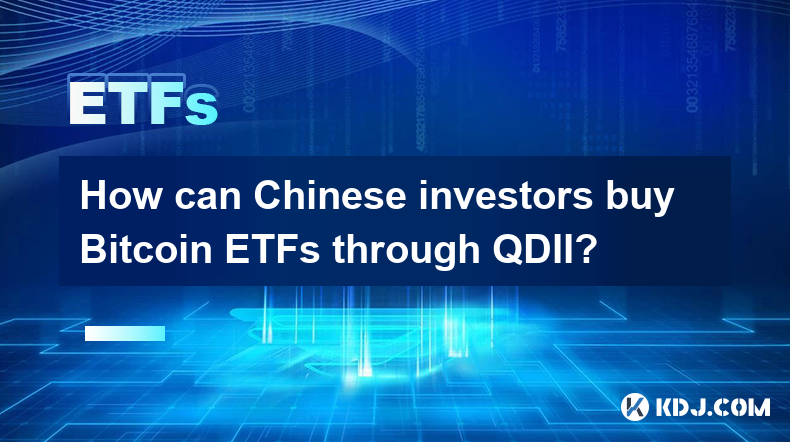
Understanding the Challenges and Opportunities
Chinese investors face unique hurdles when attempting to access global investment products like Bitcoin ETFs. Direct investment in cryptocurrencies is heavily restricted within mainland China. However, the Qualified Domestic Institutional Investor (QDII) scheme offers a potential pathway, albeit with limitations. QDII allows qualified Chinese financial institutions to invest in overseas securities, including potentially Bitcoin ETFs listed on foreign exchanges. The key lies in understanding the intricacies of the QDII program and the available ETF options.
Navigating the QDII Framework
The QDII program is tightly regulated by the China Securities Regulatory Commission (CSRC). Only approved institutions can participate, and they are subject to strict quotas and investment guidelines. This means not all institutions offer access to overseas crypto-related products, and even those that do may have limited allocations. Finding a QDII fund that invests in Bitcoin ETFs requires diligent research and understanding of the fund's investment strategy and associated risks. It's crucial to verify the legitimacy of any institution claiming to offer such access.
Identifying Eligible Bitcoin ETFs
Not all Bitcoin ETFs are created equal, and not all are accessible through QDII. Investors need to identify ETFs listed on exchanges accessible to QDII funds, which typically means major exchanges like the NYSE or NASDAQ. Furthermore, the ETF's underlying assets and investment strategy must align with the QDII fund's mandate. Some ETFs may focus solely on Bitcoin, while others might have a broader portfolio encompassing other cryptocurrencies or related assets. Understanding the ETF's composition is crucial for risk assessment.
The Step-by-Step Process (Illustrative)
While the exact process varies depending on the chosen QDII fund and institution, the general steps involved are as follows:
- Find a Qualified Institution: Identify a financial institution in China authorized to participate in the QDII program and offering access to relevant international investment opportunities.
- Open an Account: Open a QDII account with the selected institution. This typically involves providing necessary documentation and completing the required Know Your Customer (KYC) and Anti-Money Laundering (AML) procedures.
- Select the Bitcoin ETF: Choose a Bitcoin ETF listed on an accessible exchange and meeting the fund's investment criteria. Carefully review the ETF's prospectus to understand its risks and fees.
- Place an Investment: Submit an investment request to purchase shares of the selected Bitcoin ETF through your QDII account. The process may involve specific forms and approvals.
- Monitor Your Investment: Regularly monitor the performance of your investment. Remember that the value of Bitcoin and Bitcoin ETFs can fluctuate significantly.
Understanding the Risks
Investing in Bitcoin ETFs through QDII carries inherent risks. These include:
- Regulatory Risk: Changes in Chinese regulations concerning QDII or cryptocurrency investments could impact access to or performance of the investments.
- Market Risk: Bitcoin's price volatility exposes investors to significant potential losses.
- Counterparty Risk: The risk associated with the QDII fund manager's ability to manage the investment and meet its obligations.
- Exchange Rate Risk: Fluctuations in exchange rates between the Chinese Yuan (CNY) and the currency of the ETF's listing exchange can affect returns.
Further Considerations
The availability of Bitcoin ETFs accessible through QDII is subject to change. Investors should regularly check with their chosen financial institutions for updates on eligible products. The fees associated with QDII investments, including management fees and transaction costs, can also impact overall returns. It is vital to understand all fees involved before investing. The process may also involve longer processing times compared to direct investments in domestic markets.
Frequently Asked Questions
Q: Are all Bitcoin ETFs accessible through QDII?
A: No. Only Bitcoin ETFs listed on exchanges accessible to QDII funds and meeting their investment criteria are eligible.
Q: What are the risks involved in buying Bitcoin ETFs through QDII?
A: Risks include regulatory changes, Bitcoin's price volatility, counterparty risk, and exchange rate fluctuations.
Q: How can I find a qualified institution offering QDII access to Bitcoin ETFs?
A: Research financial institutions in China authorized for QDII participation and inquire about their offerings. Verify their legitimacy and credentials.
Q: What documents are needed to open a QDII account?
A: Requirements vary by institution, but typically include identification documents, proof of address, and potentially other financial documentation.
Q: What are the fees associated with investing in Bitcoin ETFs through QDII?
A: Fees include management fees charged by the QDII fund, transaction costs, and potentially other administrative fees. Review the fund's prospectus for a complete fee schedule.
Q: Can I directly invest in Bitcoin through QDII?
A: QDII typically focuses on investing in established securities, such as ETFs. Direct investment in Bitcoin is generally not permitted through QDII due to regulatory restrictions on direct cryptocurrency holdings.
Q: How often can I buy or sell Bitcoin ETFs through my QDII account?
A: The frequency of transactions depends on the specific QDII fund's rules and the underlying ETF's trading liquidity.
Q: What happens if the Bitcoin ETF I invested in performs poorly?
A: The value of your investment will decrease, potentially resulting in a loss. Remember that investing in cryptocurrencies involves significant risk.
Q: Are there any tax implications for investing in Bitcoin ETFs through QDII?
A: Tax implications depend on both Chinese and international tax laws. Consult with a qualified tax advisor to understand the tax implications specific to your situation.
Disclaimer:info@kdj.com
The information provided is not trading advice. kdj.com does not assume any responsibility for any investments made based on the information provided in this article. Cryptocurrencies are highly volatile and it is highly recommended that you invest with caution after thorough research!
If you believe that the content used on this website infringes your copyright, please contact us immediately (info@kdj.com) and we will delete it promptly.
- Gold Dips from Record High as Market Turmoil Sparks Profit-Taking
- 2025-04-04 08:35:12
- Factors such as whale accumulation, bullish technical indicators, and market sentiment have contributed to this optimistic outlook.
- 2025-04-04 08:35:12
- With the crypto market entering a new growth cycle in 2025
- 2025-04-04 08:30:11
- EOS Price Defies the Market Crash: +46% in a Week!
- 2025-04-04 08:30:11
- BlockDAG (BDAG) Breaks Records With 2,380% Presale Price Jump, Outpacing Dogecoin (DOGE) and Kaspa (KAS)
- 2025-04-04 08:25:12
- Economic uncertainty and a major crypto exchange hack pushed down the total value locked in DeFi protocols to $156 billion in the first quarter of 2025
- 2025-04-04 08:25:12
Related knowledge
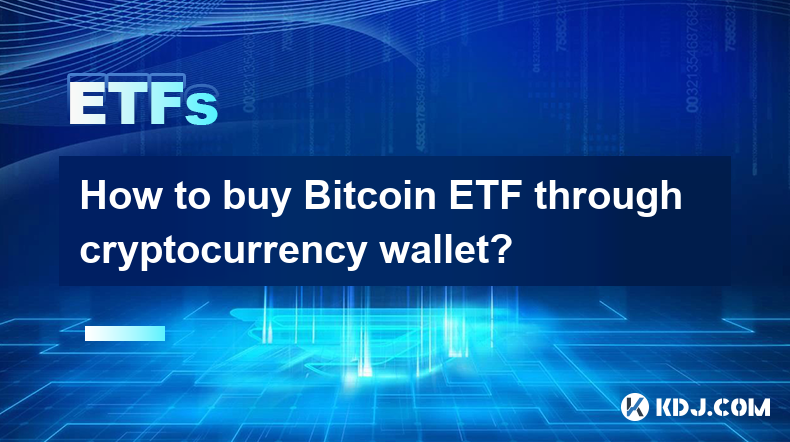
How to buy Bitcoin ETF through cryptocurrency wallet?
Mar 30,2025 at 08:22pm
It's important to understand that you cannot directly buy a Bitcoin ETF through a cryptocurrency wallet. Cryptocurrency wallets are designed to hold and manage digital assets like Bitcoin itself, not exchange-traded funds (ETFs). Bitcoin ETFs are traded on traditional stock exchanges, not decentralized cryptocurrency exchanges. Therefore, the process i...
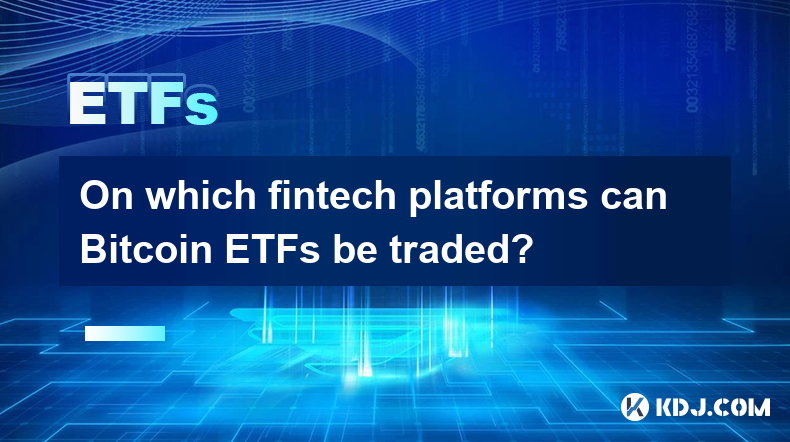
On which fintech platforms can Bitcoin ETFs be traded?
Mar 28,2025 at 09:21am
Navigating the Bitcoin ETF Landscape on Fintech PlatformsThe availability of Bitcoin ETFs on fintech platforms is a rapidly evolving landscape. Currently, the approval and subsequent listing of Bitcoin ETFs are subject to regulatory hurdles and vary significantly by jurisdiction. Therefore, the specific platforms offering Bitcoin ETF trading depend hea...
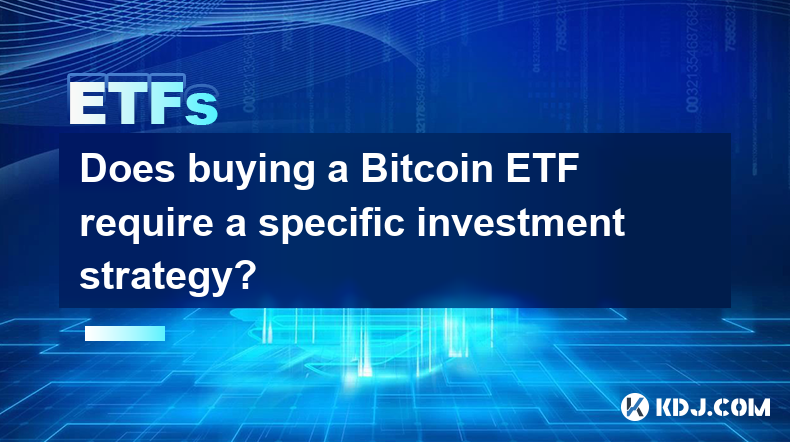
Does buying a Bitcoin ETF require a specific investment strategy?
Mar 27,2025 at 06:36pm
Understanding Bitcoin ETFs and Investment StrategiesA Bitcoin Exchange-Traded Fund (ETF) is a type of investment fund that tracks the price of Bitcoin. Investing in a Bitcoin ETF offers exposure to the cryptocurrency market without the complexities of directly owning and securing Bitcoin. However, like any investment, a successful strategy requires car...
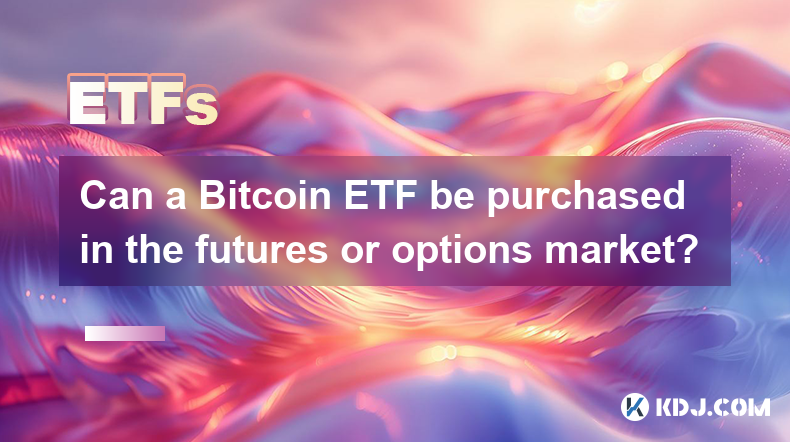
Can a Bitcoin ETF be purchased in the futures or options market?
Mar 27,2025 at 02:49am
Understanding Bitcoin ETFs and Derivative MarketsA Bitcoin ETF (Exchange-Traded Fund) is a fund that tracks the price of Bitcoin. Unlike directly buying Bitcoin, an ETF offers a more regulated and accessible way for investors to gain exposure to the cryptocurrency market through traditional brokerage accounts. However, the availability of a Bitcoin ETF...
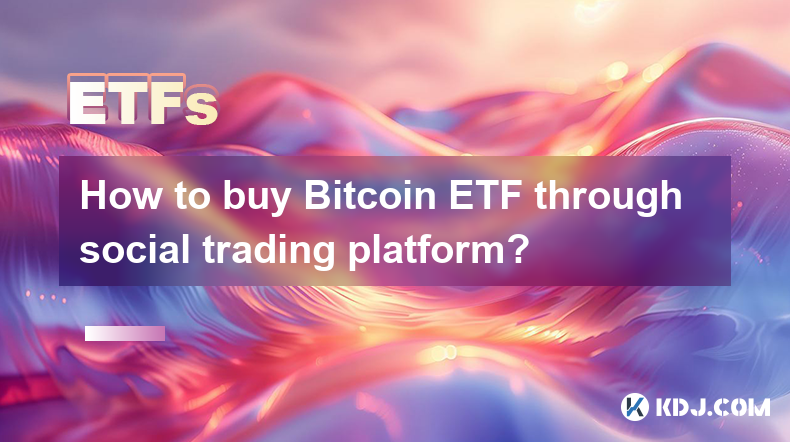
How to buy Bitcoin ETF through social trading platform?
Mar 27,2025 at 10:43am
How to Buy Bitcoin ETF Through Social Trading Platforms? Understanding Bitcoin ETFs and Social TradingA Bitcoin ETF (Exchange-Traded Fund) is a fund that tracks the price of Bitcoin. Unlike directly buying Bitcoin, an ETF offers a regulated and potentially less volatile way to gain exposure to the cryptocurrency market. This is because ETFs are traded o...
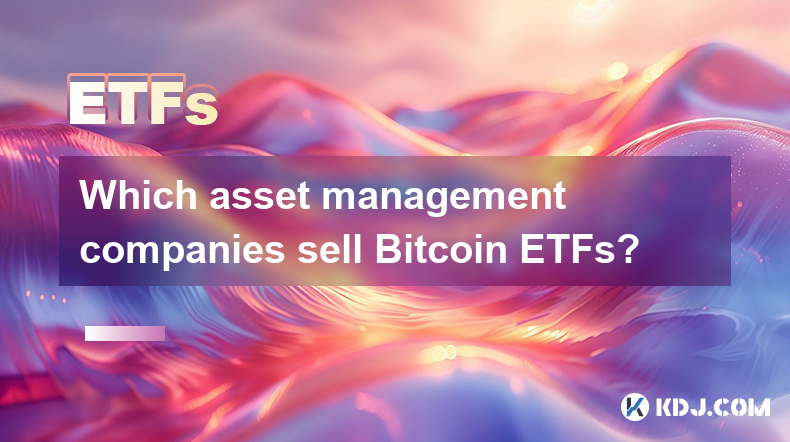
Which asset management companies sell Bitcoin ETFs?
Mar 28,2025 at 02:21am
The Current Landscape of Bitcoin ETF OfferingsCurrently, no asset management company offers a fully-fledged, SEC-approved Bitcoin ETF in the United States. While several companies have filed applications, the Securities and Exchange Commission (SEC) has yet to approve any. This is primarily due to concerns surrounding market manipulation, investor prot...

How to buy Bitcoin ETF through cryptocurrency wallet?
Mar 30,2025 at 08:22pm
It's important to understand that you cannot directly buy a Bitcoin ETF through a cryptocurrency wallet. Cryptocurrency wallets are designed to hold and manage digital assets like Bitcoin itself, not exchange-traded funds (ETFs). Bitcoin ETFs are traded on traditional stock exchanges, not decentralized cryptocurrency exchanges. Therefore, the process i...

On which fintech platforms can Bitcoin ETFs be traded?
Mar 28,2025 at 09:21am
Navigating the Bitcoin ETF Landscape on Fintech PlatformsThe availability of Bitcoin ETFs on fintech platforms is a rapidly evolving landscape. Currently, the approval and subsequent listing of Bitcoin ETFs are subject to regulatory hurdles and vary significantly by jurisdiction. Therefore, the specific platforms offering Bitcoin ETF trading depend hea...

Does buying a Bitcoin ETF require a specific investment strategy?
Mar 27,2025 at 06:36pm
Understanding Bitcoin ETFs and Investment StrategiesA Bitcoin Exchange-Traded Fund (ETF) is a type of investment fund that tracks the price of Bitcoin. Investing in a Bitcoin ETF offers exposure to the cryptocurrency market without the complexities of directly owning and securing Bitcoin. However, like any investment, a successful strategy requires car...

Can a Bitcoin ETF be purchased in the futures or options market?
Mar 27,2025 at 02:49am
Understanding Bitcoin ETFs and Derivative MarketsA Bitcoin ETF (Exchange-Traded Fund) is a fund that tracks the price of Bitcoin. Unlike directly buying Bitcoin, an ETF offers a more regulated and accessible way for investors to gain exposure to the cryptocurrency market through traditional brokerage accounts. However, the availability of a Bitcoin ETF...

How to buy Bitcoin ETF through social trading platform?
Mar 27,2025 at 10:43am
How to Buy Bitcoin ETF Through Social Trading Platforms? Understanding Bitcoin ETFs and Social TradingA Bitcoin ETF (Exchange-Traded Fund) is a fund that tracks the price of Bitcoin. Unlike directly buying Bitcoin, an ETF offers a regulated and potentially less volatile way to gain exposure to the cryptocurrency market. This is because ETFs are traded o...

Which asset management companies sell Bitcoin ETFs?
Mar 28,2025 at 02:21am
The Current Landscape of Bitcoin ETF OfferingsCurrently, no asset management company offers a fully-fledged, SEC-approved Bitcoin ETF in the United States. While several companies have filed applications, the Securities and Exchange Commission (SEC) has yet to approve any. This is primarily due to concerns surrounding market manipulation, investor prot...
See all articles






















































































